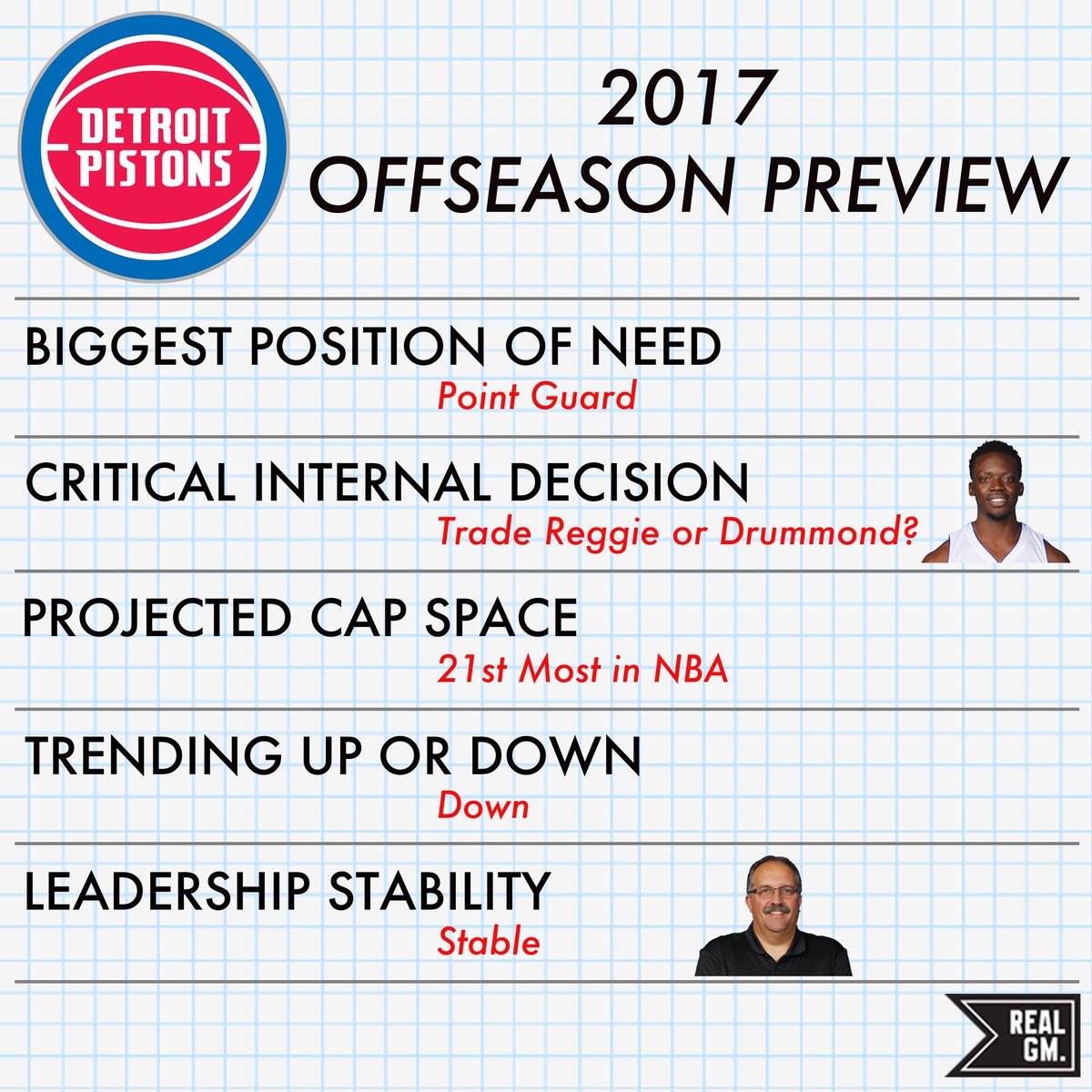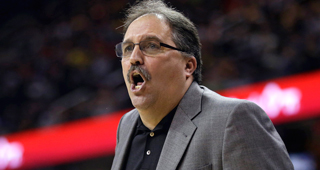Coming off a season that saw the Detroit Pistons make the playoffs and give the eventual champion Cleveland Cavaliers four competitive first round games, the Pistons backslid and missed the postseason for the seventh time in the last eight years in 2017. This was due to a combination of injuries and poor play, which left Detroit with a lot more questions than answers heading into the summer.
In the 2016 offseason, Detroit was looking at a solid starting five and wanted to make solid depth additions around them. They selected Henry Ellenson in the middle of the first round, hoping he would give them the stretch 4 the roster had previously lacked. Instead, Ellenson proved unready for the NBA and spent almost the entire year shuttling between Detroit and Grand Rapids in the D-League. Michael Gbinije, the team’s second round pick, took the same path as Ellenson, and Detroit got next to nothing from their draft class.
Oft-injured Jodie Meeks was traded to the Orlando Magic, where he promptly suffered through another injury-filled season. The Pistons then let several other free agents leave and hit the summer with cap space to add to a promising roster. Detroit added a trio of players ticketed to be key reserves in Jon Leuer, Ish Smith and Boban Marjanovic.
Leuer was signed to give the team another stretch 4 element they wanted next to Andre Drummond, and while he averaged a career-high 10.2 point per game, he shot just 29 percent from behind the arc. Leuer did start 34 games and gave the team solid production in a rotation with Tobias Harris and Marcus Morris. He just wasn’t the shooter the team had hoped he might be.
Smith, on the other hand, was far better than the Pistons had even hoped he would be. With Reggie Jackson undergoing surgery late in the offseason, Smith was unexpectedly thrust into the starting point guard role. He proceeded to have one of the better seasons of his well-traveled career. He even won back the starting job after Jackson returned and was ineffective. Smith had good chemistry with Drummond and fit well with the other starters, as he’s a pass-first point, as opposed to Jackson’s score-first mentality.
Marjanovic, a 7’3’’, 290 pound behemoth, was signed to be Drummond’s backup after the Spurs declined to match the offer sheet he got as a restricted free agent. He rarely played, as Stan Van Gundy largely stuck with Aron Baynes behind Drummond. But with Baynes a likely free agent, the Pistons gave Marjanovic time over the last week of the season and he responded with quality numbers. He remains a bit of an unknown, but Detroit seems to have something to work with in Marjanovic.
The last addition of note was Beno Udrih, who was claimed at the end of the preseason, when it was clear Jackson wouldn’t be back to start the year. Udrih saw almost all of his time as a backup behind Smith, while Jackson was out. When Jackson returned, Udrih rarely saw the floor.
After all their additions were in the fold, Detroit re-signed Andre Drummond to a max contract. They exploited a loophole, where they used his small cap hold to retain his restricted free agent rights. Because the Pistons could match any offer, and made it clear they would do so, this allowed them to use the rest of their cap space first, and then they signed Drummond to his new max deal.
This summer, the Pistons have four free agents, two of consequence and two they won’t extend very far to bring back. Udrih is a free agent, and unless he’s willing to return at the minimum to be a third point guard again, he’s likely to be elsewhere. He might even be on a new team no matter what. Reggie Bullock can be a restricted free agent, but the Pistons don’t have a need for him. He’s been unable to crack the rotation, even when given opportunity. Considering his qualifying offer is larger than what he’s likely to make on the open market, Detroit may not even extend one to him, at the risk of him signing it. This will allow Bullock to be an unrestricted free agent and likely would signal the end of his time with the Pistons.
Detroit’s other two free agents, Baynes and Kentavious Caldwell-Pope, are both in different situations. Baynes has been a productive backup for the Pistons, but fell off some as his touches decreased in his second year in Detroit. Considering Detroit has Drummond and Marjanovic, Baynes could look to move to another team where his chances at playing time might increase.
That leaves Caldwell-Pope, who is the key to not only this offseason, but in many ways, the future of the Pistons. Thought of as a solid defender who is able to guard both backcourt positions, Caldwell-Pope saw his offensive development stagnate a bit in 2017. Despite a career-best 35 percent on three-pointers, he shot under 40 percent overall. With Jackson on the shelf, he was Detroit’s main offensive weapon in the backcourt most nights. He was inconsistent in his production and didn’t seem ready for quite so heavy of a burden.
Despite that, Caldwell-Pope remains a player many teams are interested in. Both Philadelphia and Brooklyn have copious amounts of cap space and the need for shooting guards. Both could craft a max offer sheet, which would force the Pistons hands as to matching or not. Considering Detroit has no replacement on the roster for KCP, they might have to swallow hard and match. Stanley Johnson is a fine enough prospect, but he’s not ready for a starting role and may ultimately be more of a small forward then a shooting guard as his career develops.
And therein lies the challenge for the Pistons. They are already staring at an expensive and somewhat limited roster. Drummond is on a max contract, Jackson received a large contract when he was a free agent, and Harris was traded for while already on a large deal. This leaves Detroit potentially facing the luxury tax if they are forced to give or match a max deal for Caldwell-Pope.
Because of that, and some questionable fits on the roster, the Pistons explored trades for Jackson and Drummond both. They reportedly engaged Orlando in trade talks for Jackson, but ultimately got nowhere. Several teams discussed trading for Drummond as well. Van Gundy, as both coach and President of Basketball Operations, is in a tricky spot. The coach in him wants to be as competitive as possible and get to the postseason. The front office side of Van Gundy has to balance that goal with the long term health of the franchise.
They’ll probably also use their draft pick on the best player available, but could target a point guard. Considering they were close to moving Jackson, and Smith is best as a backup, the Pistons could look towards the future in the draft. The draft has several good point guard options, but the very best are expected to be just out of Detroit’s reach at the top of the draft.
With little chance at cap space, even if they lose all of their free agents, expect Detroit to match any offer on Caldwell-Pope. They can’t replace him and he’s young enough that continued improvement can still be expected. This will make the roster expensive, but that is something that Van Gundy can work on by moving contracts as the season progresses. That might even include moving on from Drummond or Jackson, or really anyone. Van Gundy is aggressive and will do what he has to in order to set the Pistons back on a course to consistent playoff berths.
Offseason Details
Guaranteed Contracts (9): Andre Drummond, Henry Ellenson, Tobias Harris, Reggie Jackson, Stanley Johnson, Jon Leuer, Boban Marjanovic, Marcus Morris, Ish Smith
Partial/Non-Guaranteed Contracts (2): Michael Gbinije, Darrun Hilliard II
Potential Free Agents (4): Aron Baynes (UFA – Player Option), Reggie Bullock (RFA), Kentavious Caldwell-Pope (RFA), Beno Udrih (UFA)
“Dead” Money on Cap (1): $5,331,729 (Josh Smith)
First Round Draft Pick(s) (pre-Lottery): Pick #12
Maximum Cap Space: None. $23,782,717 over
Projected Cap Space: None. $23,782,717 over




